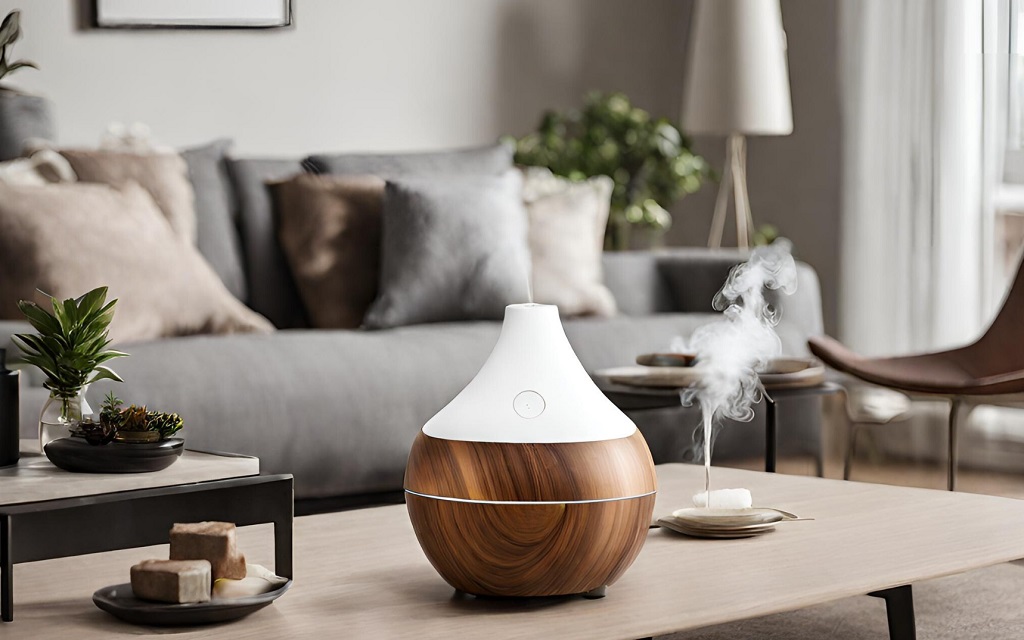Aromatherapy and aromachology have gained significant popularity in recent years for their natural and convenient approaches to improve mood, promote relaxation, and enhance overall well-being.
Our sense of smell is closely connected to our emotions and memories, and harnessing the power of scent can have a profound, positive impact on our overall physical and mental health.
In this article, we explore the science behind the sense of smell, the therapeutic benefits of scent therapy, and how you can incorporate scent therapy into your daily routine for a healthier lifestyle and more enjoyable home.
Table of Contents
- Scent Trends Countering Consumer Skepticism
- Aromatherapy vs. Aromachology: What’s the Difference?
- The Science Behind the Sense of Smell
- Introduction to Scent Therapy
- Therapeutic Benefits of Scent Therapy
- Scent Therapy Ideas for a Healthier Home
- Frequently Asked Questions About Scent Therapy
- Conclusion: Scent Therapy Recap
Also see:
Scent Trends Countering Consumer Skepticism
Whether you’re familiar with scent therapy or already have an opinion on aromatherapy, we recommend keeping an open mind on how scent, as well as natural remedies, can improve your well-being.
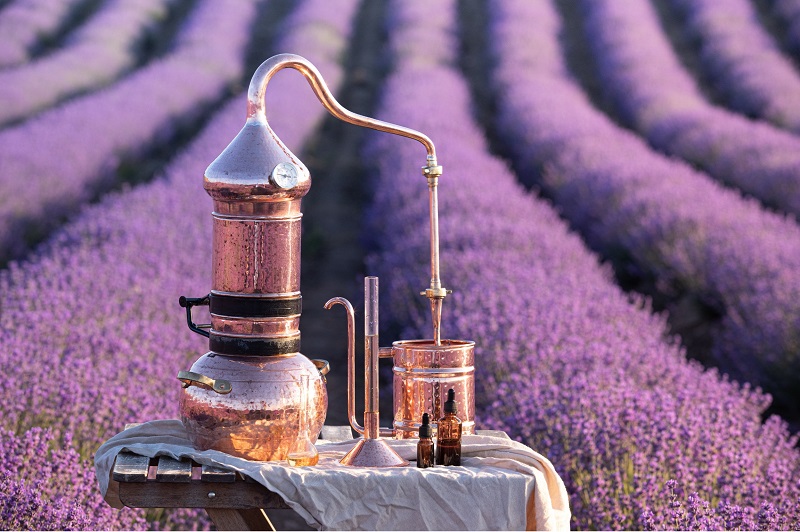
Here are current wellness trends that support the belief that the market for scent therapy will continue to grow for many years to come:
- Growing consumer preference for natural, nonpharmacological, non-invasive, alternative health remedies with minimal adverse effects
- Increasing consumer focus on mental health, stress management, sleep quality, and home wellness
- Rising consumer awareness of therapeutic properties of essential oils and their ability to improve emotional well-being
- Increasing preferences for nonpharmacological treatments when possible due to fewer side-effects
- Growing recognition of the close relationship between pain and psychological distress
- Understanding how to manage pain safely and effectively for maintaining good psychological health and healthy aging
- New research continues to support the positive impact of scent on mood, stress levels, and cognitive function
- Aromachology studies continue to provide understanding and scientific explanations for aromatherapy practices that have existed for hundreds of years
- The aromatherapy market is projected to grow to $4.95 Billion by 2030, from an estimated $1.91 Billion in 2022, according to Data Bridge Market Research
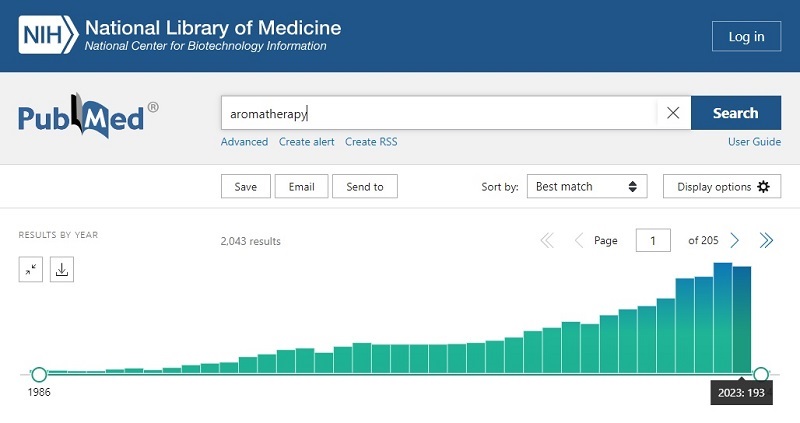
Annual number of scientific studies related to Aromatherapy in the National Library of Medicine search engine PubMed
In 2023, there were 193 results for the search term “Aromatherapy”
Aromatherapy vs. Aromachology: What’s the Difference?
Although both aromatherapy and aromachology pertain to scent and human behavior, aromatherapy is concerned with “which“ scents cause specific physiological responses, while aromachology looks at the mechanism of action or the “why and how“ a scent causes a particular reaction in humans.

In order to set the correct mood and ambiance best suited for your personal needs and home environment, it’s essential to understand both of these scent subjects. This insight will help you determine which scent is best suited to achieve a particular response or to help bring about a particular emotional behavior.
Key to this understanding is being aware of the key role that memory plays when selecting scents. Though a specific type of scent may have documented positive effects on humans in general, your response may be different if, for instance, the given scent conjures an unpleasant memory or negative association.
The Science Behind the Sense of Smell
Our sense of smell, also known as olfaction, is a fascinating and complex system that plays a vital role in our daily lives. Smell dysfunction can be caused by viral infections, head trauma, and certain medical conditions, and can have a significant impact on our overall well-being.

The sense of smell is closely connected to the sense of taste, and without smell, our sense of taste would be greatly diminished. The olfactory system, which includes the olfactory nerves and brain connectivity, is responsible for detecting and interpreting odors, and any disruption in this system can lead to smell loss and dysfunction.
Interesting Fact:
Our sense of smell is the only fully developed sense in the human fetus. Thus, this may explain why smells have a longer, more instantaneous memory for humans. For example, have you ever experienced a distinct smell taking you immediately back to an experience from long ago? This is a result of our more developed olfactory systems which have been with us since our birth.
How Our Sense of Smell Works
Our sense of smell relies on the olfactory system, which starts with the olfactory receptors (hairs) in our nose. When we smell something, odor molecules bind to these receptors, and the information is then sent to the brain for processing and interpretation.
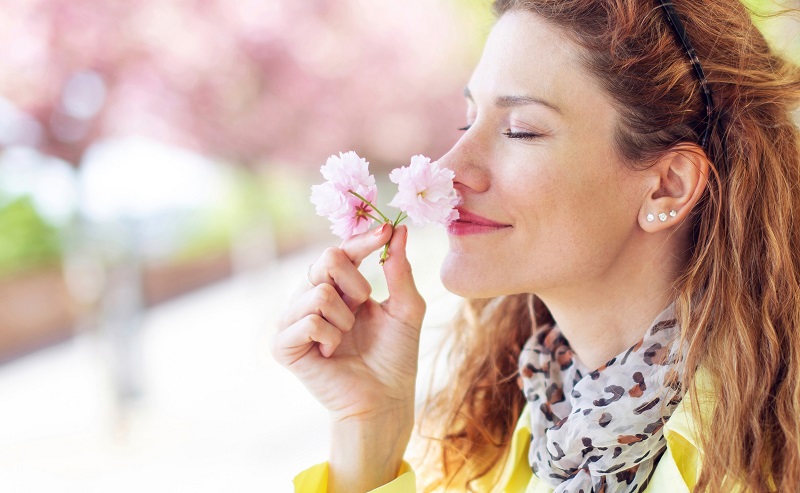
All other senses — hearing, taste, touch and sound — must be processed through the thalamus, the brain’s relay station. However, our sense of smell stands out as the only sense that bypasses the thalamus and routes directly to the hippocampus for memory and the amygdala, which is the brain’s processing center for emotions.
With repeated behaviors, scent becomes attached to memories. Thus, smelling an evergreen may evoke a sentimental smile if, for example, natural Christmas trees and garlands were essential elements of happily celebrating the holidays throughout your childhood. It is important to remember the role of memory and the brain when understanding one’s reaction to a particular aroma. In other words, if you witnessed a traumatic event while walking in a lavender field, that scent would invoke those memories and perhaps feelings of angst would surface when lavender is nearby.
Generally speaking, certain scents such as evergreen, freshly baked breads or pastry generate a positive emotion. However, if a negative event is tied to any one of these aromas, your reaction would be more in line with the memory evoking a stress response such as a rapid heart rate or the need to flee or get away.
Key Insight:
With repeated behaviors, scent becomes attached to memories.
This concept is important since the amygdala is responsible for sending signals to areas of the brain such as the hypothalamus that will invoke a “flight or fight” response. Imagine, without a sense of smell you’re unable to sense spoiled foods, nearby dangerous wildlife, or detect something as simple as a gas leak. Our sense of smell is vital to our safety and security.
Neck surgery and certain medical conditions, such as viral infections, can lead to smell loss and dysfunction, as they can damage or disrupt the olfactory system.
The Impact of Scents on Mood, Well-Being and Memory
The use of aromatherapy and fragrance has long been recognized for its ability to positively influence mood and well-being. Different aromas, such as lavender and peppermint, have generally been found to have therapeutic effects and can promote relaxation, reduce stress, and improve sleep quality.
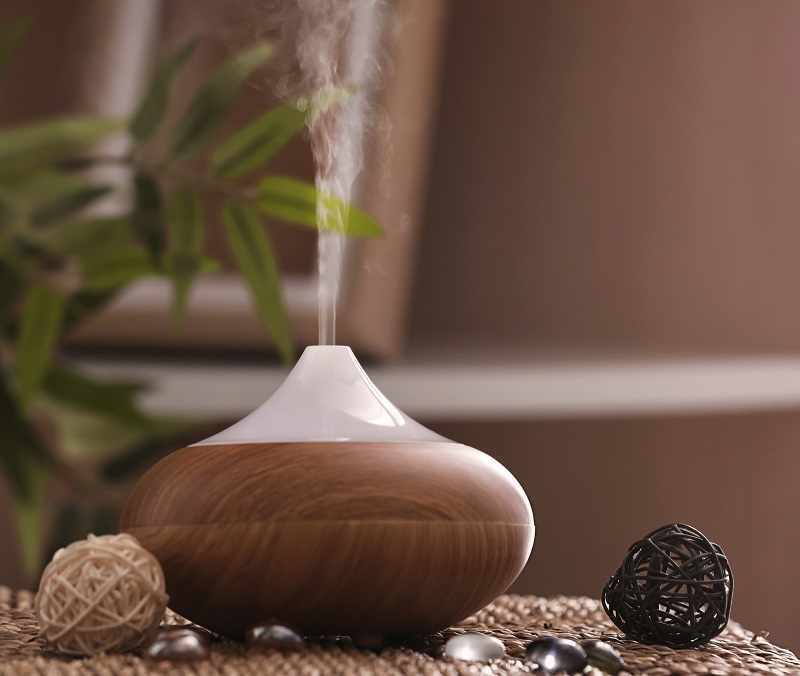
Scents like eucalyptus and bergamot can alleviate headaches and create a sense of calm. Scent therapy, whether through essential oil diffusers or aromatherapy wax melts, offers a natural and convenient approach to supporting overall health and well-being.
As previously mentioned, olfaction receptors are directly routed to areas of the brain that control memory and emotional processing, which in turn trigger appropriate behaviors based on scent and memory. There are also physiological effects of certain aromas such as peppermint, rosemary and camphor to improve memory, especially in Alzheimer and traumatic brain injury patients.
Introduction to Scent Therapy
Scent therapy, also known as aromatherapy, has a rich history and has been used for centuries in various cultures for healing and relaxation. The use of essential oils and aromatherapy has roots in ancient traditions and continues to be a popular and effective method of promoting overall well-being and enhancing our sense of smell.
In recent years, scent therapy has gained recognition and popularity in modern wellness practices, thanks to documented therapeutic benefits and the increasing interest in scent dysfunction, such as anosmia (smell loss), hyposmia (reduced smell), parosmia (distorted sense of smell), and phantosmia (distorted sense of smell with an absence of odorant triggers). Awareness around scent dysfunction due to colds, flus and infections has dramatically increased in recent years.
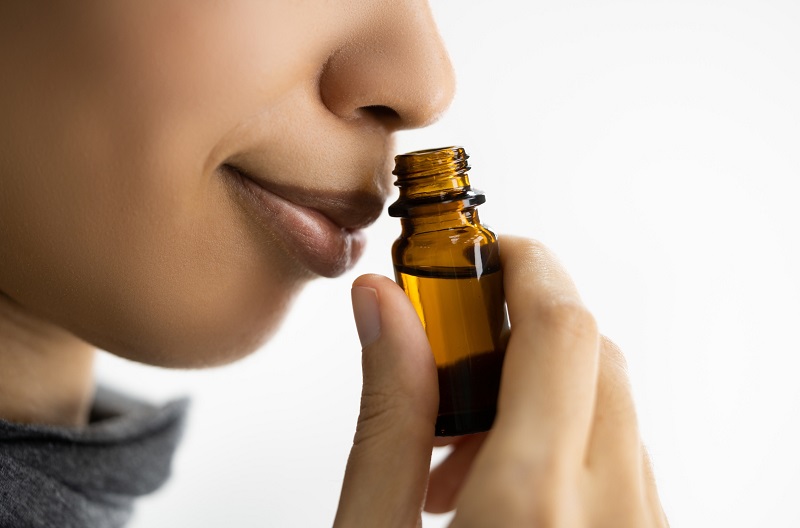
Smell Retraining Therapy (SRT) is a popular treatment for scent dysfunction that involves the daily repetition over several months of exposing patients to different scents to improve their sense of smell.
Also see:
Therapeutic Benefits of Scent Therapy
Scent therapy, through the use of essential oil blends, can have a profound impact on our mental and emotional well-being. The use of scent therapy, whether through diffusers, massage lotions, or aroma diffusers, can help alleviate stress, promote relaxation, and improve sleep quality. Due to specific therapeutic benefits, incorporating scent therapy into our daily routine can contribute to a healthier lifestyle.
Scent Therapy for Healing
The therapeutic benefits of scent therapy extend beyond personal use and has shown potential in treatments and improving the quality of life for individuals facing challenging health conditions, such as:
The Importance of Scent Therapy for Aging In Place
As people age, they tend to prefer spending more time at home. For seniors aging in place, scent therapy can be particularly beneficial as it provides a non-invasive way to help maintain physical and mental health through increased relaxation, reduced stress and improved mood.
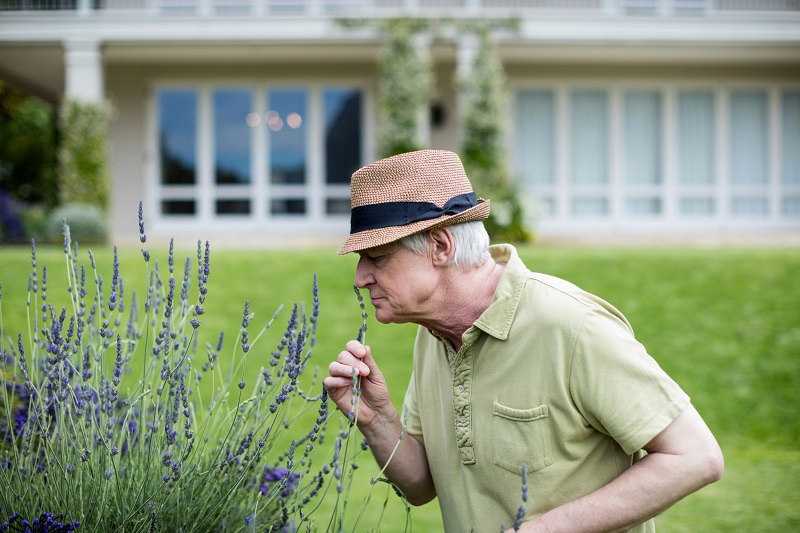
Additionally, scent therapy can help seniors with memory loss by using familiar scents that trigger positive memories and emotions. Ultimately, incorporating scent therapy into daily routines can significantly enhance the quality of life for seniors who are aging in place.
The Scent Guru Group, founded by expert fragrance designer Ruth Sutcliffe, has a unique approach to scent therapy as several of their products specifically target the aging in place and memory loss communities, as well as individuals with autism.
Though their mass-market product, Calm, is made with 100% all natural essential oil, it was necessary for them to utilize synthetic ingredients for both their Essential Awakenings memory product line and their MindScent multi-sensory educational kit. These products are primarily made from synthetic elements due to the fact that key scents (e.g. popcorn, grass, bread, campfire, etc.) necessary for effective smelling exercises cannot be replicated without the use of synthetics. It’s simply not possible to extract every natural scent into an essential oil. This is due to natural materials either being too fragile or lacking sufficient fragrance. In such cases, a synthetic “reproduction accord” is formulated in order to imitate a given scent.
The company’s all natural Calm product, however, was custom-formulated by a Master Perfumer who specializes in Ayurvedic formulation. The Scent Guru Group’s full line of stress-reducing products consist of essential oils and diffusers, including a small pocket-size porous ceramic diffuser that can be used on the go, ideal for lengthy road trips or long days at the office. All their products are responsibly packaged, vegan-friendly and cruelty-free, making them an excellent choice for those who value sustainability and ethical practices.
Also see:
Scent Therapy and Alzheimer’s Disease
Scent therapy, particularly the use of essential oils, has shown promise in improving the quality of life, as well as cognitive function and memory for individuals with Alzheimer’s disease. Essential oils, such as lavender and peppermint, have been studied for their therapeutic effects on Alzheimer’s symptoms, and research suggests that scent therapy could help reduce anxiety and agitation in Alzheimer’s patients. Again, the power of memory-connected scent can evoke positive recollections and emotions.
Also see:
Scent Therapy for Autism
Scent therapy can be used to create a calming and soothing environment for individuals with autism. Certain scents, such as lavender and chamomile, have been found to promote relaxation and reduce anxiety in people with autism.
Research also indicates that smell dysfunction is common in individuals with autism, which scent therapy can help address. Aromatherapy, using essential oils, may aid in sensory integration, while positively impacting the mood and well-being of individuals on the autism spectrum.
Also see:
- MindScent: A Multi-Sensory Educational Kit by The Scent Guru Group
- Sensory Overload: How to Make Aroma Therapy More Manageable for People With Autism
- Add Calm to Your Life with a Peaceful Sensory Garden
Using Scent Therapy in Treating Traumatic Brain Injuries
Scent therapy, especially with essential oils, can have potential benefits for individuals recovering from traumatic brain injuries. Certain scents, such as eucalyptus and peppermint, may help alleviate headaches and improve cognitive function in brain injury patients.
Smell loss, which is common in individuals with head trauma, can be addressed through scent therapy and olfactory stimulation. Scent therapy, when combined with massage therapy, may aid in reducing stress and promoting relaxation for brain injury patients, and aromatherapy using essential oils has shown promise in supporting emotional and psychological well-being in individuals with traumatic brain injuries.
Scent Therapy Ideas for a Healthier Home
Creating a healthy and inviting home environment is essential for our overall well-being, and scent therapy can play a significant role in achieving this. Different scents have different effects on our mood, and incorporating specific scents into our living space can contribute to a more healthy and comfortable home.
- Relaxation and Sleep: Lavender
- Concentration and Mood Enhancement: Lemon
- Respiratory Health: Eucalyptus
- How to Incorporate Scent Therapy into Your Daily Routine
- Scent Therapy Ideas from the Luxury Hospitality Industry
- Scent Therapy Shopping Resources
Relaxation and Sleep: Lavender
Lavender essential oil is widely recognized for its calming properties and its ability to promote relaxation and restful sleep. Aromatherapy with lavender scent has been linked to reduced stress and anxiety and contributing to improved sleep quality.
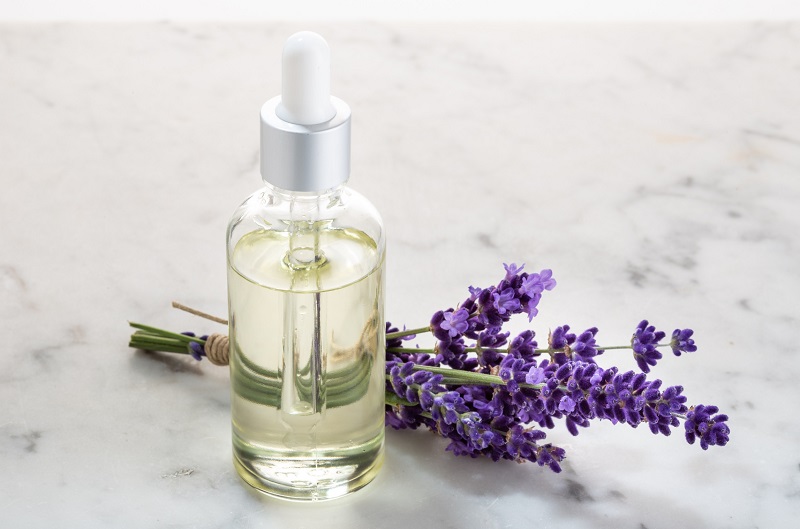
The soothing aroma of lavender can create a tranquil and serene environment, ideal for relaxation and unwinding. Incorporating lavender scent into your home environment can help create a peaceful and stress-relieving atmosphere, and lavender scent has been shown to have a positive impact on mood and emotional well-being, fostering a sense of calm.
Scents good for a calming effect and sleep inducement:
- Lavender
- Chamomile
- Sandalwood
- Rose
- Bergamot
- Geranium
- Jasmine
- Sweet Marjoram
Also see:
Concentration and Mood Enhancement: Lemon
Lemon essential oil is known for its refreshing and uplifting scent, promoting enhanced concentration and mental clarity. The invigorating aroma of lemon can help create a bright and cheerful atmosphere, boosting mood and energy levels.
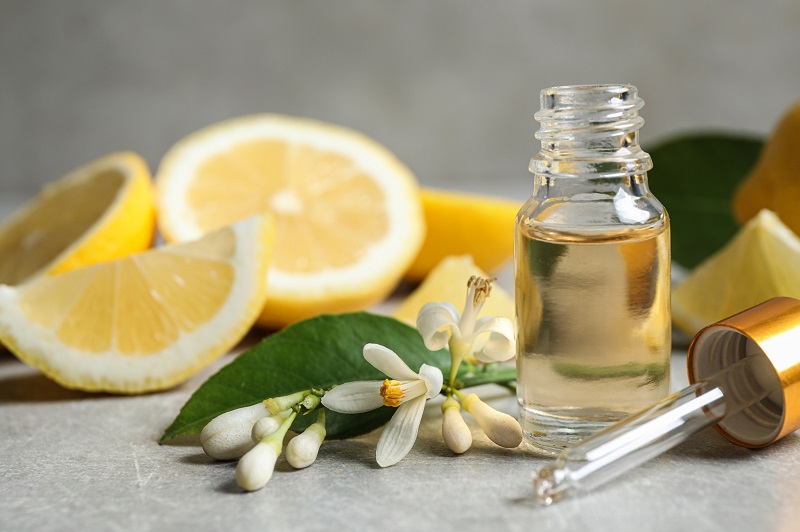
Aromatherapy with lemon scent may contribute to a positive and revitalizing ambiance, ideal for productivity and focus. Incorporating lemon scent into your living space can create an uplifting and vibrant environment, enhancing overall well-being. Lemon essential oil has also been associated with improved cognitive performance and a heightened sense of alertness.
Scents good for concentration and alertness:
- Lemon
- Peppermint
- Sage
- Cedarwood
- Jasmine
- Rosemary
- Frankincense
Also see:
Respiratory Health: Eucalyptus
Eucalyptus essential oil is valued for its respiratory benefits, offering a refreshing and invigorating aroma for your home. The aromatic scent of eucalyptus can help clear the airways and promote easier breathing, supporting respiratory health.
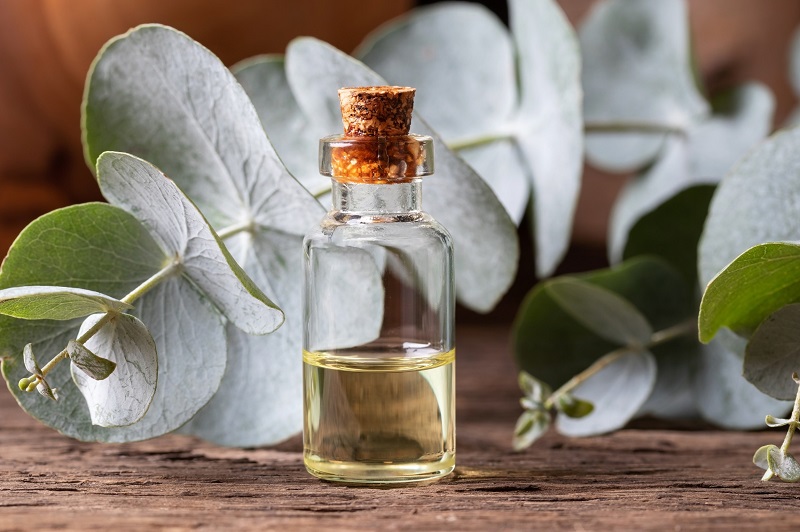
Aromatherapy with eucalyptus scent may create a rejuvenating and purifying environment, ideal for respiratory well-being. Incorporating eucalyptus scent into your home can contribute to a clean and revitalizing atmosphere, benefiting overall respiratory comfort. Eucalyptus essential oil has been recognized for its natural decongestant properties, making it a valuable addition to a healthy home environment.
Scents good for respiratory health:
- Eucalyptus
- Peppermint
- Tea Tree
- Rosemary
- Oregano
- Thyme
- Frankincense
Also see:
How to Incorporate Scent Therapy into Your Daily Routine
Incorporating scent therapy into your daily routine doesn’t have to be complicated. There are various easy ways you can use scents to create a sensory-rich and therapeutic environment in your personal space. Simple practices, such as using essential oil diffusers, essential oil wax melts, scented candles, or aroma diffusers, can add delightful and therapeutic aromas to your domain, promoting a healthier and more soothing home. Creating a personalized ritual enhances the therapeutic experience, promoting a sense of well-being in the hustle and bustle of everyday life.
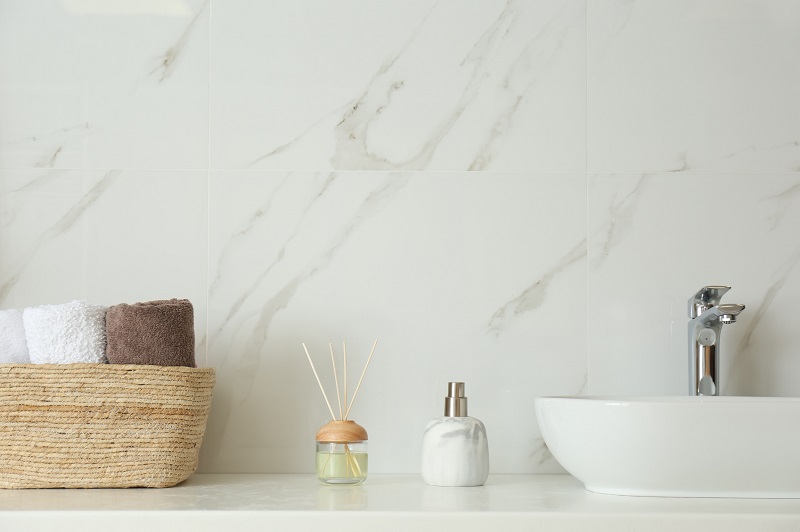
Explore different scent combinations and essential oil blends to create a rejuvenating atmosphere that suits your preferences. You can also incorporate essential oils into homemade cleaning solutions, infusing your living space with natural and aromatic freshness. Embrace the benefits of scent therapy by incorporating different essential oil fragrance blends into your daily home environment, creating a personalized scent sanctuary.
Scent Therapy Ideas from the Luxury Hospitality Industry
Scent therapy is not only beneficial for personal use but also has a place in hospitality, particularly in luxury hotels. The strategic use of scent therapy in hotels can enhance the overall guest experience and satisfaction, creating a memorable and distinct identity for each establishment.
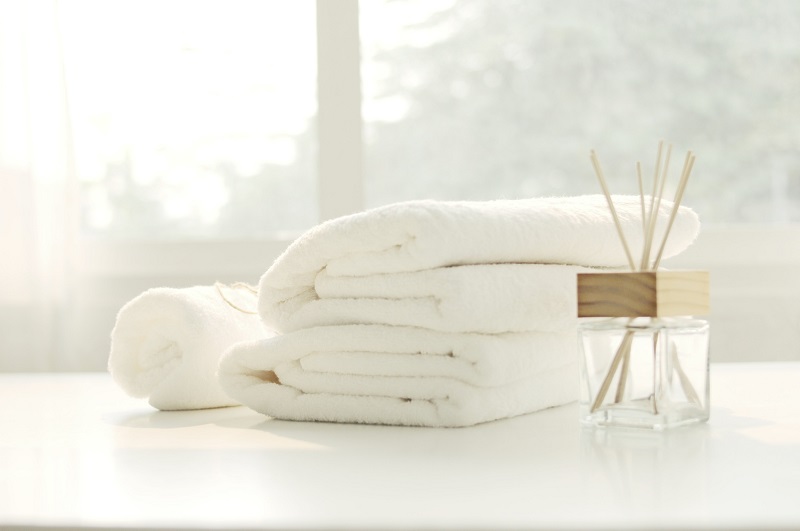
Scent selection in hospitality is tailored to evoke positive emotions and sensory responses. A well-executed scent therapy strategy can positively impact guest perceptions and behaviors, leading to increased guest loyalty and satisfaction.
Aroma treatments in hospitality settings are also influenced by cultural and regional considerations to create a harmonious and inviting atmosphere for their target audience of guests. The adoption of scent therapy in hotels is further proof of the key role scent plays in overall wellness and comfort.
Example applications of scent therapy being used in luxury hotels include:
- Custom Fragrances (brand identity)
- Lobby and Common Areas (scent diffusers and HVAC systems)
- Spa and Wellness Centers (aromatherapy treatments)
- Guest Room Amenities (scented candles, essential oil diffusers, and linen sprays)
- Scented Linens and Towels
- Signature Scented Products (soaps, shampoos, and lotions)
- Seasonal and Event-Specific Scents (cinnamon and pine for the Christmas Season)
Scent Therapy Shopping Resources
This collection of reputable, high-quality aromatherapy shops demonstrate the wide range of products, applications and benefits currently avialable in the market today:
- Aromatherapy Associates
- Aromatics
- doTERRA
- Earl of East
- Edens Garden
- Hotel Collection
- HYSSES
- Mountain Rose Herbs
- MOXĒ
- Nest New York
- Organic Aromas
- Plant Therapy
- Pura
- Rocky Mountain Oils
- Saje
- The Scent Guru Group
- Vitruvi
- Young Living
Frequently Asked Questions About Scent Therapy
- How does scent therapy work?
- How does Smell Retraining Therapy (SRT) work?
- What are the benefits of scent therapy?
- What scents or essential oils are commonly used in scent therapy?
- What is the difference between perfumery and aromatherapy?
- What are some reputable scientific findings that support the efficacy of scent therapy?
How does scent therapy work?
Scent therapy, also known as aromatherapy, utilizes essential oils and aroma diffusers to promote relaxation and healing. Essential oils can be inhaled or applied topically, providing therapeutic benefits through olfactory stimulation and sensory experiences. Different scents have different effects on the body and mind, and scent therapy can be used for stress relief, improved sleep, pain management, and more.
How does Smell Retraining Therapy (SRT) work?
Smell Retraining Therapy, also known as SRT and olfactory training, is a technique that involves exposing oneself to different scents to improve one’s sense of smell. This treatment is particularly for people who have lost their sense of smell or are experiencing olfactory dysfunction due to a medical condition or head trauma.
The process of smell training usually involves smelling four different scents twice a day for several months, which helps stimulate the olfactory nerves and improve the ability to distinguish between different smells. The four most recommended fragrances to retrain one’s sense of small are:
- Rose (floral)
- Lemon (fruity)
- Cloves (spicy)
- Eucalyptus (resinous)
Smell training can be an effective way to regain and enhance the sense of smell. Olfactory training is a non-pharmacological and non-surgical treatment option for patients with olfactory dysfunction.
What are the benefits of scent therapy?
Scent therapy offers a wide range of benefits for our physical and mental well-being. It can help reduce stress and anxiety, promote relaxation and sleep, and alleviate headaches and other physical ailments. Some essential oils, such as tea tree, used in scent therapy have antibacterial and antifungal properties. The combined strengths of scent therapy can enhance mood and emotional well-being, contributing to an overall sense of wellness.
What scents or essential oils are commonly used in scent therapy?
There are numerous scents and essential oils commonly used in scent therapy, each with its own unique benefits and properties. Lavender, known for its calming and relaxation properties, is a popular scent used in scent therapy. Peppermint, with its invigorating and refreshing aroma, is often used to promote mental clarity and concentration. Eucalyptus, valued for its respiratory benefits, is commonly used to help clear sinuses and congestion. Citrus scents, such as lemon or orange, are known for their uplifting and mood-enhancing properties, and they can create a vibrant and energizing atmosphere.
What is the difference between perfumery and aromatherapy?
While perfumery and aromatherapy both involve the use of fragrances, they differ in their purpose and approach. Perfumery involves creating fragrances for personal use or commercial products such as perfumes, candles, and soaps. It focuses on aesthetics, sensory appeal, and the art of scent blending. Aromatherapy, on the other hand, uses essential oils and plant extracts to enhance physical and emotional well-being. It is a holistic therapy that aims to improve health and treat ailments through the inhalation or topical application of aromatic substances. While perfumery is more geared towards sensory pleasure, aromatherapy has a therapeutic objective.
What are some reputable scientific findings that support the efficacy of scent therapy?
While opinions may still persist that there’s a lack of extensive scientific evidence supporting the efficacy of scent therapy, studies continue to suggest that it may have potential benefits.
Here is a random sampling of various scientific studies from recent years that support the efficacy of scent therapy:
Journal of Medicine and Life: 2021
- Aromatherapy with lavender essential oil improved working memory in women with multiple sclerosis
Clinical Journal of Oncology Nursing: 2018
- Inhaling lavender essential oil can reduce anxiety levels in patients undergoing chemotherapy
Pain Research and Treatment: 2016
- Study found aromatherapy has a significant positive effect in reducing pain and should be considered a safe, lower-cost addition to current pain management procedures, with no adverse effects
BioMed Research International: 2014
- Depression, anxiety, and stress levels were significantly reduced for community-dwelling older persons who underwent a 4-week aromatherapy program
International Journal of Neuroscience: 2008
- Study found that peppermint essential oil enhanced memory and increased alertness
While these findings are promising, more research is still needed to understand fully the potential benefits and limitations of scent therapy as an alternative medical treatment.
Conclusion: Scent Therapy Recap
Scent therapy can offer a natural and holistic approach to enhance your overall well-being and create a healthier home environment. The sense of smell has a profound impact on our mood, emotions, and overall health. By understanding the science behind our sense of smell and the therapeutic benefits of different scents, you can harness the power of scent to promote relaxation, concentration, respiratory health, and even aid in the treatment of conditions like Alzheimer’s and autism.

To incorporate scent therapy into your daily routine, consider using essential oils or natural scented products such as candles, diffusers, or room sprays. Experiment with scents like lavender for relaxation and sleep, lemon for concentration and mood enhancement, and eucalyptus for respiratory health.
Create a healthier home by incorporating scent therapy and enjoy the transformative power of fragrances in your everyday life!
Additional Health & Home Wellness Articles
- 8 Wellness Design Tips for Your Kitchen & Bath
- How to Assess and Improve the Indoor Air Quality of Your Home
- How to Create an Allergy-Free Environment in Your Home
- Sanitize Your Home with Light Fixtures – Yes, Light Fixtures!
- UV-C Products to Make Your Home Healthier & Virus Free
- Aging In Place Renovations that Add Value to Your Home
- Are Smart Meters Harmful to Your Health?
- Related Topics: Health & Home Wellness | Aging In Place | Enjoying
| Purgula is reader-supported. When you click on links to other sites from our website, we may earn affiliate commissions, at no cost to you. If you find our content to be helpful, this is an easy way for you to support our mission. Thanks! Learn more. |

